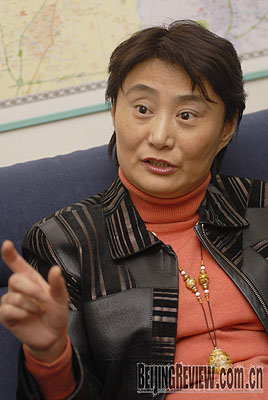|

FEMALE PERSPECTIVE: Professor Xia Yinlan of China University of Political Science and Law is an advocate for women's rights and interests (WEI YAO)
As delegates to the 10th National Women's Congress gathered in Beijing to discuss the protection of Chinese women's rights, Xia Yinlan, Dean of the School of International Education at the China University of Political Science and Law and Vice Chairwoman of the Beijing Women's Federation, talked with Beijing Review about promoting gender equality on a legal basis.
A breakthrough in the protection of women's rights and interests in China is that the country has established a legal system to safeguard them over the past five years, Xia said. The legal system, according to her, consists of the Constitution and the Law on the Protection of Women's Rights and Interests that was enacted in 1992 and revised in 2005 as the main body, with other laws and regulations as supplements.
The amendment to the law in 2005 wrote gender equality into China's legal system for the first time, and contains special articles addressing sexual harassment and domestic violence. To date, 18 provinces, municipalities and autonomous regions have worked out their own rules for implementing the law, including stipulations on the representation ratios of women in the country's government structure, and some 25 provinces, autonomous regions and municipalities have established compulsory local anti-harassment regulations, Xia said.
The revised law pays special attention to job discrimination against women. It stipulates that sex should not constitute a pretext for refusing to hire a woman, and that no role is unfit for women.
In addition, laws that are closely related to civil rights, such as the Real Right Law and the Law on Land Contracts in Rural Areas, were promulgated during the five years. These laws reinforce women's rights to private property. For example, the Law on Land Contracts in Rural Areas stipulates that female farmers enjoy equal rights to own and buy land, Xia said.
"This provision is very inspiring because economic independence is the most basic and crucial step to achieve gender equality," she added.
"Also, it is nailed down in the Law on the Protection of Women's Rights and Interests that the government is the executive body for women's issues, though women's federations at all levels, which have no executive power, are handling most complaints regarding women's rights infringements nationwide at present.
"It actually requires that related government departments must solve problems when women's federations transfer to them cases of infringements of women's rights."
While reflecting on all these legislative achievements, Xia emphasized that it is the introduction of "gender perspectives," advocated by sociologists and feminists, into the legislation process, which has made them happen. This gender perspective-oriented camp is gaining ground in the legal circle, Xia said.
However, many scholars are skeptical about the feasibility of the laws in place, particularly the Law on Protection of Women's Rights and Interests, because it is too general and somewhat ambiguous.
For one thing, the amendment requires that the country's top legislature, the National People's Congress, and local people's congresses at all levels, should have "adequate" numbers of women deputies and should "gradually raise the ratios" of women deputies in them. How many would be regarded as adequate? Other than the above-mentioned 18 provinces or regions, the highest ratio of women presentation in people's congresses at all levels in China is 30 percent, though 30 percent is a benchmark ratio in international practice, Xia observed.
| 